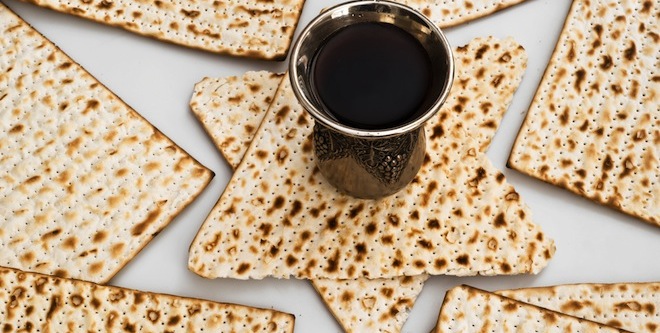Pesah Edition, P. 3
Yesterday we read this paragraph from Shulhan Arukh:
Orah Haim 447:4: If hametz was mixed [into something else] before Pesah and was nullified by a ratio of sixty, it does nor reawaken on Pesah to make the mixture forbidden by even a small amount, and some disagree.
Rema: and the practice is to follow the first opinion in any mixture of liquids with liquids.
Let us see what the Ashkenazi commentators have to say on the Rema’s statement:
R. Menachem Mendel Auerbach (Vienna-Krakow, 1620-1289), writes in Ateret Zeqenim (447:4):
עטרת זקנים סימן תמז ס”ק ד
וקמח בקמח, לח בלח מקרי, כי מתערב יפה… ונראה דאם נתערב קודם פסח פחות מששים דיכול להרבות עליו קודם הפסח עד שיהיה מותר בפסח
Flour with flour is like liquid with liquids because it mixes well, and it seems that if it was mixed before Pesah and [the ratio] is less than 1:60, one can add more [kosher for pesah] ingredients to make it kosher for Pesah.
R. Auerbach explains that the term “liquid with liquid” refers to any two ingredients which mix into a homogenous blend, and he also says that you can add ingredients to nullify the Hametz before Pesah.
The Hafetz Haim writes in Mishnah Berurah (447:32): כגון שכר שנתערב ביין וכי האי גוונא
An example of such mixture is beer which was mixed with wine…
And in his Beur Halakha he writes (447:4):
…מה שכתב הרמ”א לח בלח לאו דוקא ששניהם היו לחים, אלא אם רק החמץ היה לח אפילו ההיתר יבש, גם כן אין חוזר וניעור
The Rema’s words “liquid with liquid” also refer to a case of hametz liquid which got mixed with non-Hametz dry food. There also the Hametz does not “reawaken” on Pesah.
According to the Hafetz Haim here, if a bottle of beer tipped over and dripped into Matzah flour before Pesah, and the ratio is 1:60, you can bake Kosher Matzah with it.
In case we were thinking that these rulings were not widely accepted, R. Haim Mordechai Margulies (Brody, 1780-1820) writes in his Shaarei Teshuva (447:17):
ועיין בנודע ביהודה ח”א סי’ כ”ד שבכל מדינות פולין ואשכנז נוהגים להקל דאין חוזר וניעור בפסח
See Noda BiYehuda (1:24) who write that in all Poland and Ashkenaz the custom is to be lenient and rule that the Hametz does not “reawaken” on Pesah.
The Hafetz Haim adds in the Mishna Berura (447:33):
ויש כמה אחרונים שסוברין דאף יבש ביבש דאמרינן דחוזר וניעור אינו אא”כ יאפה או יבשל אותם בפסח דאז חוזר החמץ ונותן טעם בהשאר אבל לאכול כך שרי
Some later Poskim hold that even when the mixture is of two dry ingredients, it is only forbidden in Pesah if one bakes or cooks the mixture on Pesah, thus reawakening the Hametz which spread flavor to the rest of the mixture, but eating the mixture as it is would be fine.
We will conclude with this statement of the Magen Avraham (447:11):
בדבר יבש: כגון שנתערב חמץ במצה… לדעת הרא”ש… נעשה היתר גמור ומותר אחר כך לבשלן ביחד… מיהו לא קי”ל הכי אלא במקום הפסד, מיהו נראה לי דהכא אם יכול לבשלו עד שיהא נימוח ויתערב קודם פסח בס’ אז מותר לאכלו בפסח
Dry ingredients: for example, if Hametz was mixed with Matzah… according to Rabbenu Asher [the Rosh] it turns into a permissible mix and it is allowed to later cook the mixture… however, we only follow this ruling in case of a great financial loss. But it seems to me that if one can cook [the mixture of Hametz and Matzah] before Pesah until they melt and mix in a ratio of 1:60, it would be allowed to eat it on Pesah.
As I mentioned at the beginning of this series, my intention here is not to rule halakha but simply to show rulings of the Shulhan Arukh which do not fit our current understanding of “normative halakha”. I will say, however, that with all due respect to the Kashrut organizations, it doesn’t seem they care much about the parameters set by those Poskim, even though they all adhere to the Ashkenazi tradition. I have the feeling that if Rabbi Iserles, Rabbi Gombiner, Rabbi Landa, Rabbi Margulies, and the Hafetz Haim would have cooked a Seder meal and invite the heads of the major Kashrut organizations, they would find a way to politely, or maybe not so much, decline the invitation.









Ohr HaChaim Yomi – Emor